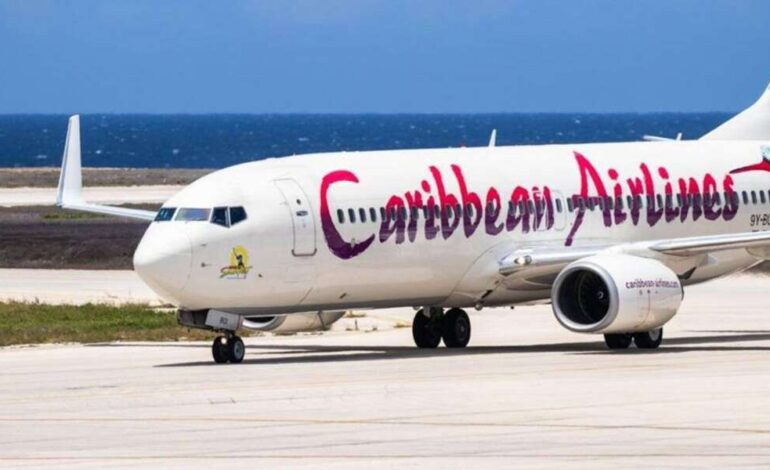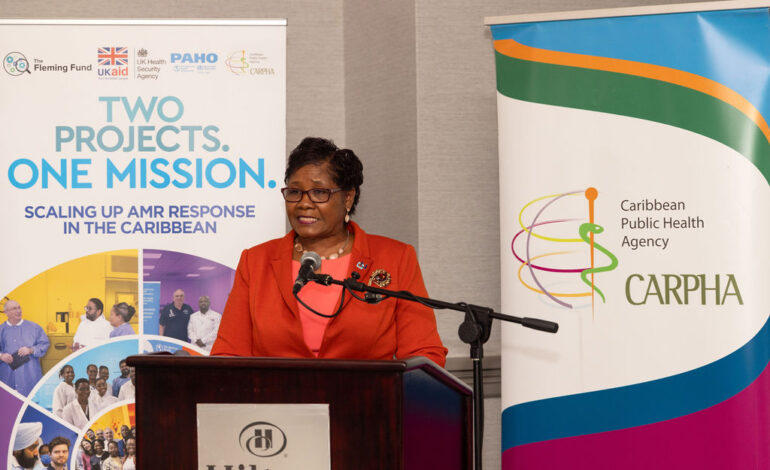
Bridgetown, Barbados. 6 May 2025 – On Monday, 5 May 2025, health leaders, development partners and regional stakeholders gathered at the Hilton Barbados Resort to launch two synergistic, landmark, regional projects under the United Kingdom (UK) Government’s Fleming Fund and jointly implemented by the Caribbean Public Health Agency (CARPHA), the Pan American Health Organization (PAHO), and the UK Health Security Agency (UKHSA). The goal is to strengthen the Caribbean’s ability to combat the global crisis of antimicrobial resistance (AMR).

AMR occurs when microbes evolve to resist treatment, making infections harder to cure. In 2019, AMR caused 1.27 million deaths and contributed to nearly five million more—surpassing HIV/AIDS and malaria. Caribbean small island and developing states face added risks due to limited lab infrastructure, transport delays, and uneven access to antibiotics. The project, ‘Strengthening Antimicrobial Resistance Response in the Caribbean’, led by PAHO is designed to upgrade microbiology laboratories in ten countries (Belize, Dominica, Grenada, Guyana, Haiti, Jamaica, Saint Lucia, Saint Vincent and the Grenadines, Suriname, and Montserrat). It will also enhance capacity at the Best-dos-Santos Public Health Laboratory in Barbados.
The Caribbean Antimicrobial Resistance Alliance (CARA), a partnership between UKHSA and CARPHA, forms part of CARPHA’s wider integrated AMR Programme aimed at enhancing the region’s capacity to detect and respond to antimicrobial resistance. Through this initiative, CARPHA is strengthening its regional laboratory network, expanding diagnostic capabilities, and improving the collection and use of AMR data. The project will support Member States by expanding reference laboratory services in Trinidad and Tobago, Jamaica, and Saint Lucia, and establishing a digital, region-wide surveillance platform. CARA also promotes regional coordination and best practice sharing, helping to align national efforts and policies to ensure timely, data-informed responses to antimicrobial resistance.
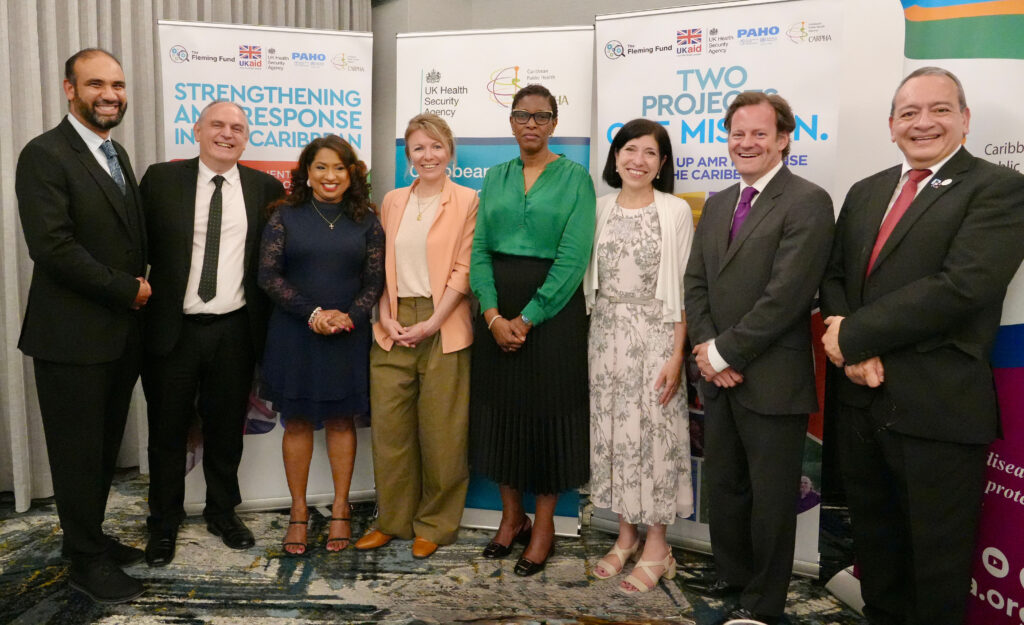
Speaking in support of the launch, Professor Dame Sally Davies, UK Special Envoy on Antimicrobial Resistance noted that AMR is a global emergency that demands urgent action. “The collaboration between UKHSA and CARPHA, supported by the Fleming Fund, is a powerful testament to our shared commitment to tackling this crisis head-on. By enhancing lab capabilities, improving surveillance, and building workforce expertise, we are taking decisive steps to protect the health of Caribbean communities and beyond. Together, we can make a lasting impact in the fight against AMR.”
Ashley Dalton, Minister of State for Public Health and Prevention (UK Department of Health and Social Care) highlighted “Antimicrobial resistance is one of the most serious and complex health challenges facing our world. The government is combating AMR through the Fleming Fund and advancing our national action plan, development models and surveillance systems. Our partnerships with the Caribbean Public
Health Agency and Pan American Health Organisation are a vital for safeguarding public health and ensuring the effectiveness of life-saving treatments for future generations.”
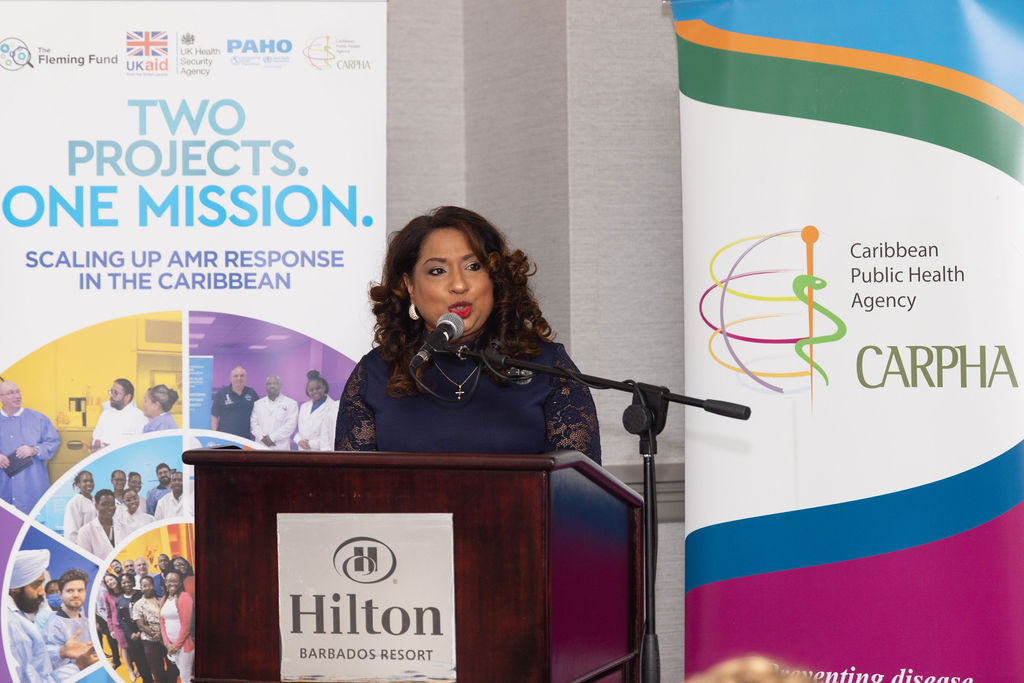
Dr. Rhonda Sealey-Thomas, Assistant Director of the Pan American Health Organization noted the strong history of collaboration to address pressing public health challenges. “AMR remains a top priority for PAHO. We are actively working with an organization-wide approach on several important initiatives in this area, from surveillance to infection prevention and control, water and sanitation, food safety, access to and the appropriate use of antimicrobials and supporting our Member States in the implementation AMR National Action Plans under a One Health approach.”
“Through CARA, we are strengthening our laboratory systems, expanding regional surveillance, and building a coordinated One Health approach to ensure that Caribbean countries are better equipped to detect, monitor, and respond to resistant infections, highlighted Dr. Lisa Indar, Executive Director of CARPHA. She stressed that AMR is one of the most serious and complex health challenges facing our region. “This collaboration reflects our shared commitment to safeguarding public health and securing the effectiveness of life-saving treatments for future generations,” Dr Indar outlined.
Dr Natalie Wright, Head of UK Overseas Territories Programme and CARA project lead at UKHSA said: “AMR is an urgent global public health and development threat, affecting all countries and regions. Sustained action is required to curb inappropriate use of antibiotics, the main driver of AMR. “Through this programme our goal is to build sustainable systems that promote data sharing, support clinical decision-making, and create lasting resilience to the threat of AMR. The work we do today will lay the foundation for a healthier, more secure future.”
Bringing remarks on behalf of the Prime Minister of Barbados, H. E. Mia Amor Mottley, who chairs the Global Leaders Group on Antimicrobial Resistance, Chief Medical Officer of Barbados, Dr Kenneth George thanked the Fleming Fund Project for supporting national and regional efforts on AMR. “Barbados has made strides in AMR Surveillance working towards full reporting to the Quadripartite Global Integrated System for surveillance of antimicrobial resistance and antimicrobial use. As some of you may be aware of the WHO/PAHO Designation of the Best-Dos Santos Public Health Laboratory as a Regional Influenza Centre, reflecting our commitment to global health standards and enhancing our capacity to respond to infectious diseases. In the next few months, we will be working with PAHO to have a similar type of designation on AMR to ensure the Best Dos Santos Public Health Laboratory can indeed be a leader in AMR within the region.” Dr George noted.
The UKHSA plays a critical role in the CARA project, sharing best practices, aligning laboratory protocols, and coordinating the roll-out of training programmes designed to strengthen laboratory capacity, antimicrobial stewardship, and AMR data analysis across the Caribbean. By bridging national and regional efforts, the projects jointly reflect a unified Caribbean commitment to protecting public health, ensuring responsible antimicrobial use, and building long-term resilience against future infectious threats.
The Fleming Fund:
The UK Department of Health and Social Care’s Fleming Fund is the world’s single largest Official Development Assistance (ODA) investment in global AMR surveillance. It supports Low- and Middle-income countries (LMICs) across Africa, Asia and the Caribbean to use data for action on AMR, a leading global public health threat.
The Fleming Fund partners with global organisations to establish and strengthen AMR surveillance systems and support the generation of high-quality AMR data to change policies and clinical practice. This is
achieved through a combination of country, regional, and global grants, and fellowships to improve laboratory infrastructure, staff capacity, and data collection and analysis capability.
About the Pan American Health Organization: The Pan American Health Organization (PAHO) works with the countries of the Americas to improve the health and quality of life of its population. Founded in 1902, it is the world’s oldest international public health agency. It serves as the Regional Office of WHO for the Americas and is the specialized health agency of the Inter-American system.
The PAHO Subregional Program is responsible for providing subregional technical cooperation and strengthening PAHO’s engagement with the Caribbean Subregional integration mechanisms, the Caribbean Community (CARICOM) and its various bodies and organs; and to build synergistic partnerships with the University of the West Indies (UWI), among others. PAHO’s subregional technical cooperation specifically focuses on public health issues which would benefit from economies of scale and for which agreement on proposed collective responses and actions would produce a far greater impact rather than individual country responses. The Subregional Program also plays a role in coordinating among the different PAHO country offices.
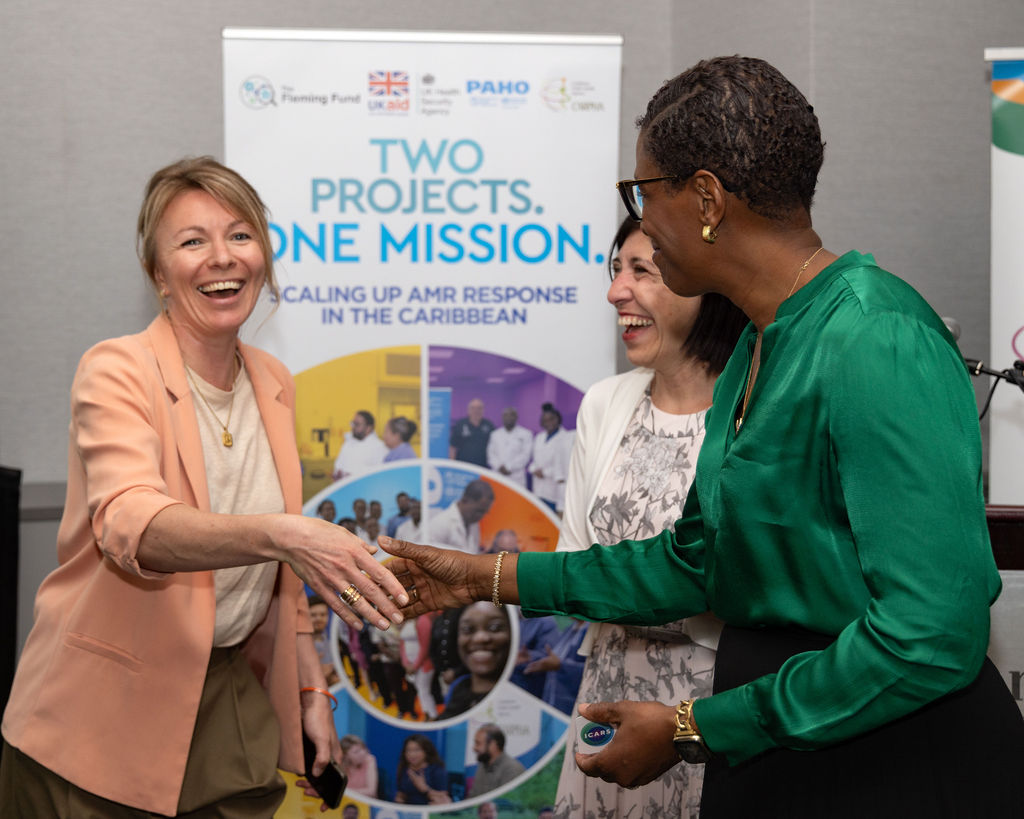
About CARPHA: The Caribbean Public Health Agency (CARPHA) is the sole regional public health agency for the Caribbean. It was legally established in July 2011 by an Inter-governmental Agreement (IGA) signed by Heads of Caribbean Governments and began operations in January 2013. The Agency rationalises public health arrangements in the Region by combining the functions of five (5) previously existing regional health institutions into a single instrument of Caribbean Cooperation in Health. These institutions were from the fields of environmental health, surveillance and epidemiology, food and nutrition, research and laboratory testing, including pharmaceutical testing.
CARPHA is the Caribbean region’s collective response to strengthening our health system approach so that we are equipped to address the changing nature of public health challenges, which threaten development.
The Agency is headquartered in Trinidad and Tobago with additional offices in Jamaica and Saint Lucia. CARPHA serves 26 Member States from CARICOM, Associate CARICOM Member States and Dutch Overseas Countries and Territories.




